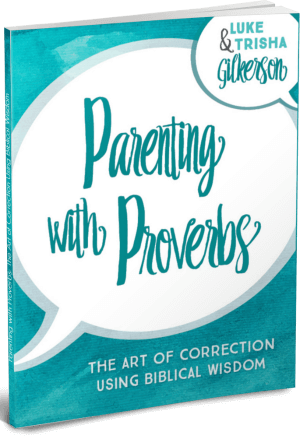Brevity is not one of my talents. I am often quick to speak and slow to listen. I use two words where only one will do. Kind people (like my wife, sometimes) might call me prolific. Unkind people (like my wife, sometimes) might call me a blabber mouth.
The same is true when it comes to correcting my children. In the moment of disobedience, defiance, complaining, or argument, I default to strong words, loud words, or many words to rein them in. In my worst moments, I rely on the strength of my voice, not the strength of what I’m saying, to get the point across to my kids.
If only there was a book out there to help Christian parents correct children effectively in the moment. If only there was a book filled with timeless wisdom I could teach my children before battles arose. If only I had the crucial words in the moment to correct my kids in a way that showed them why they should behave in a certain way.
Divinely Inspired Parental Wisdom
In His wisdom, God did not leave parents without a lifeline. He inspired a whole book in the Bible specifically for young people, written from a parent’s perspective.
It is the Book of Proverbs.
Solomon and other inspired authors wrote Proverbs “to give prudence to the simple, knowledge and discretion to the youth” (Prov. 1:4). Nearly 20 times in the introductory chapters of Proverbs, Solomon uses the phrase “my son” or “my children.” The heartbeat of the book of Proverbs is intensely personal and fatherly: “My son, give me your heart, and let your eyes observe my ways” (23:26).
Proverbs is a book of wisdom designed by God to be taught to the young, from the little child to the young adult.
5 Reasons Proverbs are Ideal for Correction
Proverbs is like the Twitter of the Bible. I don’t mean that with any disrespect. Training your mind to come up with something winsome, compelling, and provocative in 140 characters or less is demanding.
Saying something brief and powerful is difficult to do. As Blaise Pascal said, “I would have written a shorter letter, but I did not have the time.”
But God has given parents a whole book of pithy, powerful statements.
The Proverbs encapsulate quick moral lessons and wise thoughts into a short phrase, and this makes them ideal tools for parents to use to correct children.
1. Proverbs are short – When you need to steer a child’s behavior in the moment, a short statement is best. A proverb quickly anchors your thoughts on what needs to be corrected.
2. They are memorable and quotable – The Proverbs were written to be memorized and quoted aloud.
3. Proverbs state the why, not just the what – Proverbs don’t just say, “Stop it!” or “Do this!” They say, “This is wise because…”
4. They are based on real experience – Proverbs are “rules of thumb,” general truths based on universal human experiences. They are convincing because they summarize the collective experiences of many people from the past.
5. They are God’s words – When you use the Proverbs, rather than pointing merely to your own authority as a parent, you are pointing to God’s authority. If your children continue to disobey, they do so knowing they are contending with God, not you.
The Proverbs Method of Correction
Below is a simple method for training your children using the Proverbs.
Step #1: Make a list of the most pressing behavior issues your children have
Sit down in a quiet moment (preferably with your spouse if you are married) and think through all the behavior concerns you have for your kids. These could be bad habits you want your kids to stop (lying, whining), bad attitudes you don’t want your kids to demonstrate (ingratitude, laziness, impatience), personality weaknesses (cowardice), good character traits you want your kids to have (keeping promises, humility, kindness), or matters of wise living (good stewardship, being flexible, hospitality).
Step #2: Pick the top 2 or 3 issues
The aim isn’t to correct everything all at once, but to pick the top 2 or 3 most pressing issues—the ones that come up more often or seem to be the most life-disturbing for the family.
Step #3: Find the best proverb for each issue
Mine the Book of Proverbs for the best proverb to go with each issue you want to address. Choose just one proverb for each issue. Keep it simple.
Step #4: Commit each proverb to memory
Take time to memorize each proverb. My preferred method is to “stuff” the Bible passage daily: repeat the verse aloud over and over for 5 minutes a day. Do that for a couple weeks or until you feel you really have them down cold. Set a reminder in your phone or on your calendar to review the verses every few days, then once a week, then once a month—pushing the verses into your long-term memory.
Step #5: Discuss and apply each proverb one at a time with your kids
Whenever is most natural—during family devotions, mealtimes, tucking them in at night, etc.—discuss each proverb one at a time with your children. Talk about what the proverbs mean and why they apply to our lives—not just to your kids, but to you.
Step #6: Start using each proverb in problem moments
After you’ve discussed the relevant proverb with your children in a calm moment, the next time you see the behavior problem…
- Pause and get close to your child – One of the best correctives the Proverbs give is to you—the parent. When you are intentional about dispensing proverbial wisdom, you are forced to stop, think, and collect your whits before you talk. Let’s face it: proverbs sound pretty stupid when you shout them across a chaotic room.
- Listen to your child’s heart first – Don’t push the child’s emotions aside. Remember: “If one gives an answer before he hears, it is his folly and shame” (Prov. 18:13). It may help to repeat aloud the emotions or thoughts you think your child is having at that moment: “You’re upset because…” “When you did this you wanted…” “When you acted this way, you were trying to…” let them know you hear their heart.
- Remind your child what the proverb says – Start by saying, “Remember what the Scriptures say…” or “Remember what the Proverbs say…” Because you have the proverb memorized, you will sound confident and definite in your stance.
- Give a simple interpretation – Interpret the proverb in simple terms. Use this basic template: “This means it is wise/good t0 [behavior/attitude], because if we do [promised blessing]” or “This means it is bad/unwise to [behavior/attitude], because if we do [consequence].”
- State clear expectations or engage in dialogue – Your child may be too young to respond with an intelligent thought, or even with older children, the time isn’t right to get into a discussion. In these cases, simply state your expectation of them for that moment. However, if the opportunity is ripe, ask your child how they could solve the issue they are facing.
Step #7: Start using each proverb in moments of virtue
Don’t just use the proverb to correct. Use it to encourage good behavior. When your children display moments of virtue, let them know you noticed, quote the proverb, and reinforce the blessing implied by the proverb for their proper behavior.
Lather, Rise, Repeat
Do this for each problem or issue with your children.
In time, your child will start to know some of these proverbs by heart. You’ll be able to state the beginning of the proverb and they will be able to respond with the end. It will become a common language you share with them.
Parenting with Proverbs
This is what inspired me to write Parenting with Proverbs: The Art of Biblical Correction Using Biblical Wisdom.

- Lazy vs. Hardworking
- Sloppy vs. Diligent
- Deceitful vs. Truthful
- Emotionally Impulsive vs. Self-Controlled
- Greedy vs. Generous
- Indifferent vs. Attentive to Elders
- Argumentative vs. Obedient
- Hurtful Words vs. Kind Words
- Prideful vs. Humble
- Envious vs. Rejoicing with Others
- Quarreling vs. Peacemaking
- Bad Friendships vs. Good Relationships
- Bitter vs. Forgiving
- Complaining vs. Gratefulness
Each character trait chapter also includes:
- A short Bible study connecting the proverbs to the person of Christ
- Quick interpretations for in-the-moment corrections
- Dialogue questions for your kids
- The digital version also includes Scripture-memory cards for every proverb in the book.
You can grab the digital book in our store or the softcover book on Amazon.











I have a question. In the bundle it has your write through the Bible Isaiah pack. Which one is included, the print or cursive, ESV or KJV? Thanks.
Both the ESV and KJV cursive are included. BUT… there is a special coupon at the front of the book so you can download the print books free :). Hope that helps!
I love the idea of using the proverbs this way to instruct us as we instruct our kids!
Wow, this is a powerful article Luke. Thank you. I am kind of baffled by the fact that I have not heard this advice before. I have heard about using scripture to teach our children (obviously!). But the proverbs specifically and in this way….that is new to me. I am very excited about your new digital book on the subject, and look forward to directing my friends to buy their ultimate bundles here so they can get your book as well! SWEET DEAL!
Thank you so much, Sarah!
I realized how much I do this with English proverbs, like “Hope for the best, but prepare for the worst,” or “The early bird catches the worm.” I thought: “Why not do this with the Proverbs God gave us?”
Thanks for sending people our way to get our book!
This article falls right into the discussion my mother-n-law were having about parenting God’s way. Instead of just stating, don’t do that because I said so, stating how it relates to God’s vision and His purpose is more powerful.
Thanks for sharing your insights and guidance at Inspire Me Mondays!
Thanks! Glad this was encouraging to you!
I purchased the Ultimate Bundle from you and when I went to input my receipt code it comes up and all then takes me back to this page? Is there a way to confirm that you have my correct info? When I tried a few moments ago it also gave me an error message..so I want to be sure that it went through..Thank you!
Hi Katrina,
I just went and checked and you are on our list 🙂 Watch for an email after the sale is over. We’re planning to send a confirmation email to everyone and give them an ETA on the book. Have a great day!